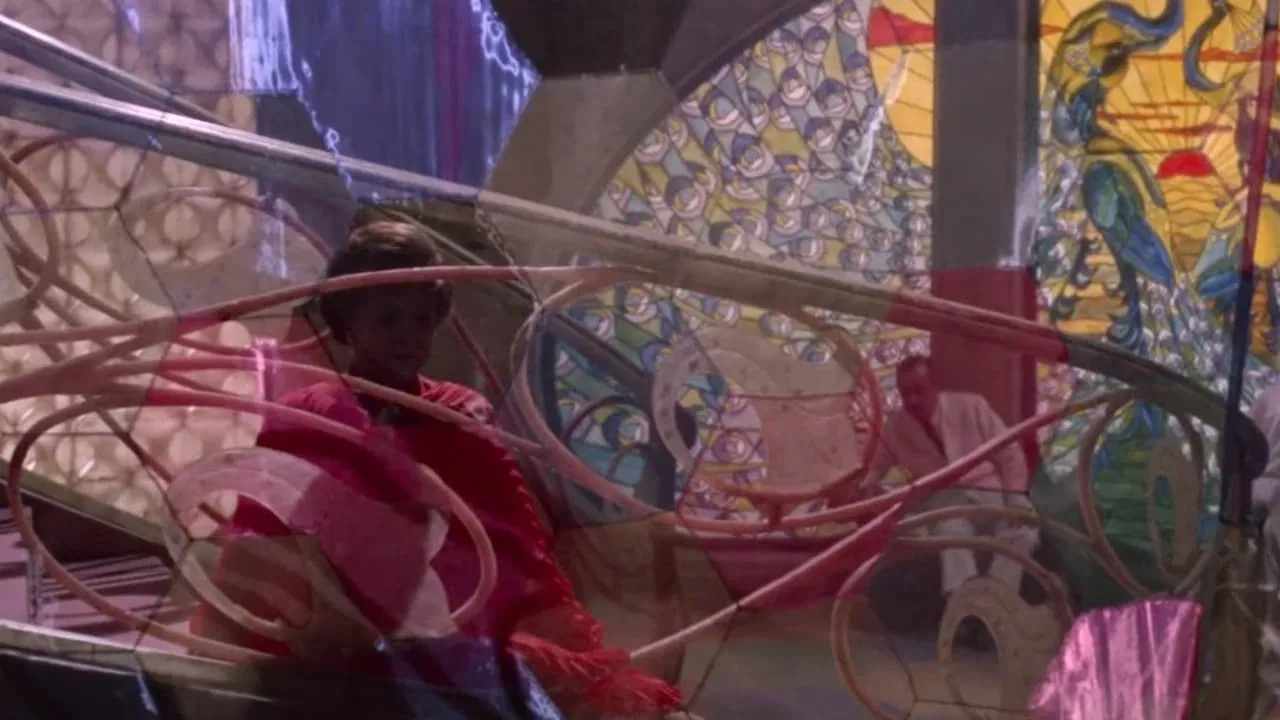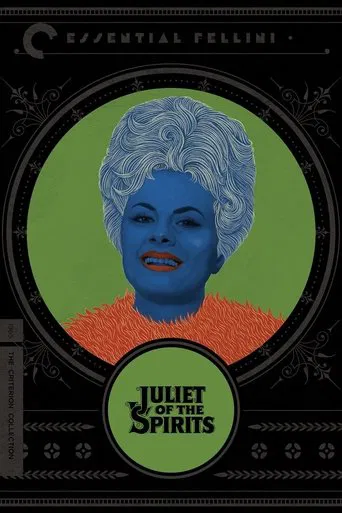

Juliet of the Spirits (Italian: Giulietta degli spiriti) (1965) Art film tackles Freud. Disturbing and indulgent, Surreal dreams, strange scenes, A female 8½, Technicolor Fellini! Tanka, literally "short poem", is a form of poetry consisting of five lines, unrhymed, with the 5-7-5-7-7 syllable format. #Tanka #PoemReview
... View MoreVisions, memories, and mysticism all help a forty-something woman (Giulietta Masina) to find the strength to leave her cheating husband (Mario Pisu).This was Fellini's first feature-length color film, and he used that color as best he could. Stephen Holden wrote, "Fellini went deliriously and brilliantly bananas with the color to create a rollicking through-the-looking-glass series of tableaux evoking a woman's troubled psyche." Roger Ebert wrote, "The movie is generally considered to mark the beginning of Fellini's decline... I think it's Fellini's best movie." Now, I would not necessarily say this is his best movie, but I also would not say it was not. Indeed, it has so much going on that it is hard to ignore. Not just the color, but the fantasy. As Ebert points out, this was supposed to be Fellini's film for his wife, but is obviously still told from his perspective...
... View MoreIncredibly beautiful this film is, Fellini's first use of colour results in some of the best use of it ever committed to celluloid. With striking design and chic outfits to die for. Unbelievable hats. A witty and playful score, full of 60's European eccentricity.Many scenes are wonderfully conceived and made. Much is sexy - and fun. Fellini himself described "Guiletta of the Spirits" as a 'fairy tale for adults'. However, all of it is one long (I mean over-long long), narrative-free zone, a mishmash of supposedly Guilletta Masina's (Fellini's wife and long standing lead in many of his films) dreams and fantasies. She, as the overlooked wife of husband, played by Mario Pisu, who incidentally played Fellini in the previous film, the autobiographical 8 and a half, finds herself bored, becoming frumpy and unloved. Her friends are younger, sexually active and liberated and she, naturally is envious and frustrated.The actual events of Guilletta's life and her friendship get ever more blurred into fantasy and as the film progresses, this turns into either a self-indulgent slurry of incomprehensible images or dreams of utter beauty and imagination, depending on where your viewpoint stands - and indeed, where the film veers you.The thoughts and fantasies aren't all pleasant and dreamy; paranoid delusions appearing and telling her (the "Spirits" of the title, perhaps) that her husband is cheating on her and that her comfortable life is no longer quite so. Guilletta's acting in previous films had been outstanding, making them unforgettable and truly great. I'm not saying her acting skills are diminished in this, just that it's swamped by all the over-the-top sets and scenes that focus on the fantasy and not her.This viewing was my second and I was fairly determined to follow it and fathom what it all meant. No chance! Let it slip by and enjoy and appreciate the bits you like best. It's also a fairly common belief that the fantasies are Fellini's own and he used this vehicle as an outlet for them. Maybe, after inundating us so successfully and brilliantly in 8 and a half with his own inadequacies, feelings and complexes, found he had yet more that he simply had to get out of his system.Whatever was going through this genius of a director at the time, the film is a must for Fellini fans. For anybody else and especially those who haven't seen the likes of Il Bidone, La Strada, La Dolce Vita and Nights of Cabiria, watch them first. Then you might have a chance to understand - and follow, this master finally losing it. He does so brilliantly but brilliance without substance can get wearying after a while. Practically any other director doing the same would result in a total dud.In my view, a very flawed masterpiece. A contradiction in terms? Well, it is Federico Fellini we're talking about!
... View MoreFellini, after his two 1960s famous productions, LA DOLCE VITA and 8 1/2, made GIULIETTA DEGLI SPIRITI (1965), not only his first color film but a unique surreal work at various levels of analysis. While the two earlier movies dealt with the psyche of the male characters portrayed by Marcello Mastroianni, this movie deals with the psyche of a middle aged wealthy woman portrayed by Giulietta Masina, not only an actress - someone much more important: Fellini's wife who was at his side throughout his career. Yet, this is the film where Fellini becomes pretty vague, psychedelic towards viewers, but, at the same time, very friendly and sympathetic towards Giulietta. When I saw this film as a 17 year-old youngster, I did not like it. Now, however, when I see it again after 12 years, it appears much more artistic and clearer to me.This is a sort of film that real connoisseurs of art will find ambiguous. Its entire content as well as its core idea have been, for all these 42 years, a true mystery: why the odd experience of the main character's mind affects us so powerfully, so magically? Fellini does not give final answers, he never does in his movies, he never forces us to like him - he invites us for the journey to the psyche. He introduces to us a profound insight into the very peripheries of a mind of the main character. Giulietta (Giulietta Masina) copes with a problem: her husband Giorgio (Mario Pisu) has a mistress. Some advise her to be a temple of love for her husband, some tell her to relax and ignore that, some prompt her to make more weird fun of life, to let out desires: these are the spirits who visit her, the spirits of her past and, supposedly, her presence. The transfers from reality are sometimes fluent, yet sometimes vague. We see various images derived from Giulietta's imagination where Fellini becomes very erotic like in his later work SATYRICON and uniquely egocentric like in no other of his movies. He claimed to have taken LSD before filming some scenes and therefore, the movie is at times extremely weird and pretty terrifying.Because of its purely Felliniesque nature characterized as blending reality and fantasy, GIULIETTA DEGLI SPIRITI is not for everyone. It's, similarly to 8 1/2, rather a PSYCHOLOGY than LINEAR CONTENT and STORY. There are flashbacks, there are dreams, there are, foremost, fantasies. Moreover, this is yet another time Fellini has manifested his opinion about an individual within a decadent society. He seems to criticize social situations, its noise that looks for rest in magic and sensation. Meanwhile, he identifies with the characters, he understands them. It's at the same time, a biographical movie where, again, Fellini attempts at addressing the conscience of forgiveness to the female character in a marriage. Therefore, such short comments will never discuss the movie justly because it has to be deeply analyzed.All those are resembled in many beautifully photographed scenes. For instance, I'll never forget the first 40 minutes of the film when we have a clear presentation of the characters and events of everyday life that have a serious impact on Giulietta's psyche. She is preparing a romantic party on the wedding anniversary; yet, her husband invites many noisy people to their house: various people, all bored with their wealth looking for more ecstasies. She does not show anger nor dissatisfaction and says to herself in the mirror: "At least don't be led to crying!" In Giulietta's house, they organize a meeting where they call spirits who post messages: "love for all" or "harlot" addressed to one lady whose aim in life is to sculpt, cook and make love. There is also a message for Giulietta: "Poor child, no one cares for you!" From this moment, Giulietta feels lost. She takes the words seriously and this leads her to a series of mental states that bring her to the very edge of hope, the very peripheries of mind; yet finally to a beautiful catharsis. Here, I would mention the character of Jose (Jose Luis De Villalonga), Giorgio's friend who offers Giulietta the drink, Sangria, and who gives her a beautiful advice about simplicity and water.The performances are brilliant. Giulietta Masina does something really extraordinary in this movie. It is the third Fellini's movie after LA STRADA and NIGHTS OF CABIRIA where she was cast in the lead and here, we clearly see a mature woman absorbed by the naiveness of a child. She partly reflects Gelsomina and partly Cabiria; yet, Giulietta is neither the LA STRADA nor NIGHTS OF CABIRIA character: she is unique. In my opinion, Masina's Giulietta is one of the very best female roles in the history of cinema. Other great cast are Valentina Cortese as magic-absorbed Valentina, Sandra Milo as sensual woman of fantasies Suzy, Mario Pisu as the unfaithful husband and Lou Gilbert as the grandfather.There is, however, a harmful aspect of the movie, too. What I mean by "harmful" is that the whole story does not have a more profound development of the consequence, a "moral" that always makes art more "ordered" and "available" for human mind and thought. Creativeness of order leads to harmony of art and Fellini ignores that in the movie. There is a cry for the reference to the sublime self assessment of human mind and actions. Why does Giulietta regain hope? What is the gist of those spirits in a life? What is the power of her psyche? Such questions may appear after seeing the film and may leave a viewer confused at times.All in all, this is an important movie, a truly Felliniesque one. Although it is not my favorite work of the director, GIULIETTA DEGLI SPIRITI is, undeniably, a work of art thanks to its uniqueness, its performances, photography and direction.
... View More